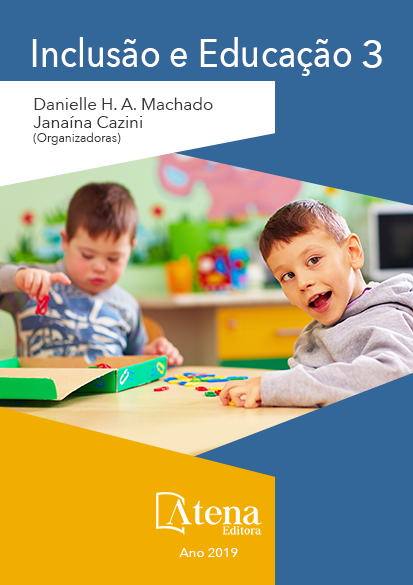
INCLUSÃO EDUCACIONAL DE CRIANÇAS COM DEFICIÊNCIA NA EDUCAÇÃO INFANTIL: um estudo de caso
O artigo apresenta dados de uma
pesquisa realizada no Município de João
Pessoa (PB), e tem como objetivo analisar
uma proposta de diagnóstico psicopedagógico
interdisciplinar, para identificar o grau de
deficiência intelectual em uma criança de seis
anos, que frequenta uma Escola de Educação
Infantil do município. A questão norteadora da
pesquisa foi a seguinte: como elaborar técnicas
projetivas e sessões lúdicas que contribuam
para realizar um diagnóstico das crianças, no
sentido de poder detectar o grau de deficiência
de modo a poder auxiliar no planejamento
de conteúdos aos professores? Do ponto de
vista metodológico, trata-se de uma pesquisa
qualitativa, do tipo estudo de caso. O método
aplicado foi o descritivo. No que diz respeito aos
sujeitos, a pesquisa foi aplicada a uma criança
que frequentava a Turma Infantil IV (de seis anos
de idade) de uma escola particular mantida por
uma fundação nacional, e sua respectiva mãe. A
pesquisa conclui que a proposta de diagnóstico
psicopedagógico mostrou-se altamente
confiável para auferir o grau de deficiência da
criança, assim como também para identificar
suas potencialidades e principais dificuldades.
No entanto, é preocupante que o trabalho
diagnóstico não tenha sido valorizado pela
Direção da escola, ao não liberar a professora
da turma onde estudava a criança para ouvir
as principais considerações que o relatório
apresentava. Para poder garantir a inclusão
educacional da criança com deficiência
intelectual, é necessário assegurar o direito
à educação das crianças na perspectiva de
garantir uma proposta educacional de qualidade,
socialmente referenciada.
INCLUSÃO EDUCACIONAL DE CRIANÇAS COM DEFICIÊNCIA NA EDUCAÇÃO INFANTIL: um estudo de caso
-
DOI: 10.22533/at.ed.3151915013
-
Palavras-chave: Educação Infantil; Inclusão Educacional; Crianças com deficiência.
-
Keywords: Early Childhood Education; Educational Inclusion; Children with disabilities.
-
Abstract:
The article presents data from
a research carried out in the city of João
Pessoa (PB), and aims to analyze a proposed
interdisciplinary psychopedagogical diagnosis
to identify the degree of intellectual disability
in a six year old child attending a School of
Early Childhood Education of the municipality.
The guiding question of the research was: how
to elaborate projective techniques and play
sessions that contribute to make a diagnosis of
the children, in the sense of being able to detect
the degree of deficiency in order to be able to
help in the planning of contents to the teachers?
From the methodological point of view, this is a
qualitative research, of the case study type. The applied method was the descriptive
one. Regarding the subjects, the research was applied to a child attending the Children’s
Class IV (six years old) of a private school maintained by a national foundation, and their
respective mother. The research concludes that the proposal of psychopedagogical
diagnosis was highly reliable in order to assess the degree of the child’s disability, as
well as to identify their potentialities and main difficulties. However, it is worrying that
the diagnostic work has not been valued by the school leadership, by not releasing the
teacher from the class where she studied the child to hear the main considerations that
the report presented. In order to guarantee the educational inclusion of children with
intellectual disabilities, it is necessary to ensure the right to education of children with
a view to guaranteeing a quality education, socially referenced.
-
Número de páginas: 15
- Leidyjane Claudino de Lima


